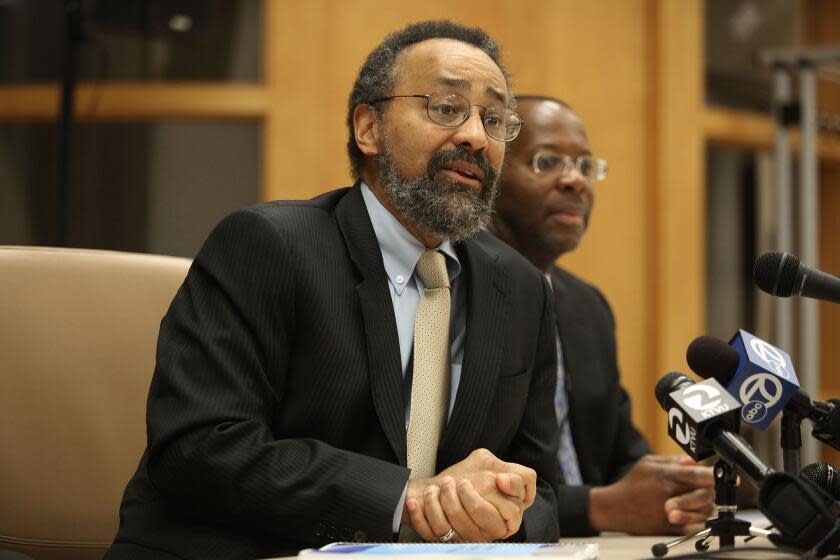Christopher Edley Jr., former dean of UC Berkeley School of Law, dies at 71

Christopher Edley Jr., a law professor and former dean of the UC Berkeley School of Law who served in senior positions for five presidential campaigns including those of Hillary Clinton and Barack Obama, has died. He was 71.
His death was announced Friday morning by current Berkeley Law dean Erwin Chemerinsky in a written message to staff.
“Chris and I were law school classmates,” Chemerinsky wrote. “He has been a dear friend and has provided me invaluable wisdom and support in my years as a dean. I know I speak for all of us in saying how terribly much we will miss him.”
Many who admired Edley’s work or had worked alongside him took to social media to express their reaction to his death.
“Chris was a man of extraordinary gifts,” wrote Gary Orfield, who co-founded the Harvard Civil Rights Project with Edley. “We tended to cut into problems from different angles working toward the same destination and I learned a lot and greatly enjoyed the seven years we were continuously working on launching a major research [and] policy center. He's gone far too soon and he will be missed on many fronts”
“The passing of Christopher Edley is a big loss for Social Justice communities. So many Giants leaving us,” wrote Stephen G. Hall, a historian.
Read more: UC Berkeley insider known for questioning the status quo is named new chancellor
The UC system's more hands-off response to pro-Palestinian protests that recently spread across its campuses was shaped by the "Response to Protests on UC Campuses" report written by Edley with Charles Robinson, UC general counsel.
The 2012 report was written in response to demonstrations at the Davis and Berkeley campuses, where students protesting economic and social inequality during the Occupy movement were beaten and pepper sprayed by police officers. The report called for a need to balance 1st Amendment rights with campus safety and security.
It placed communication and dialogue as a “cornerstone” of the UC system's response, with police force used as the last resort. In a key underlying principle, the report called for “a substantial shift away from a mindset that has been focused primarily on the maintenance of order and adherence to rules and regulations to a more open and communicative attitude.”
“What’s so bad about students pitching tents on a green? That doesn’t threaten the core teaching and research mission,” Edley told the Times last month. “It’s messy and appears to create turmoil, but ... you’re dealing with a large community of 20-year-olds who we expect to be passionate and who we know are collecting experiences as well as knowledge. It’s incumbent on us to be as tolerant as possible without compromising fundamentals.”
Edley was born Jan. 13, 1953 in Boston and had a long and successful career in academia and public service. He graduated from Swarthmore College in 1973 with a degree in mathematics. He received his juris doctorate from Harvard Law School in 1978 and his master's in public policy from the Harvard Kennedy School, according to his profile. He also served as a professor at Harvard Law School for 23 years, where in 1996 he co-founded the Harvard Civil Rights Project, a think tank aimed at promoting racial and ethnic justice.
He served as an economic policy and budget official for President Jimmy Carter and President Bill Clinton. Edley also helped lead the Clinton administration’s review of affirmative action programs.
In a written statement, Clinton described Edley as a "brilliant mind and a kind, good heart that he put to use to build a better, fairer and more just America."
“From his groundbreaking academic career to his service in multiple key roles in my administration, he always believed that law and policy are ultimately about people," Clinton wrote. "He mastered the minute details but never lost sight of the big picture — giving more people the chance to live their best lives. He is gone far too soon, but his legacy will endure.”
Edley held senior positions in five presidential campaigns including those of Michael Dukkakis in 1988, Al Gore in 2000, Howard Dean in 2004, Obama in 2008 and Hilary Clinton in 2016.
In 2004, Edley became dean of the UC Berkeley School of Law, serving until 2013.
Read more: Stanford names Jonathan Levin, business school dean, new president after leadership crisis
“As dean, he made an enormous positive difference in every aspect of the law school, from the hiring of many terrific faculty … ,” Chemerinsky wrote, “to dramatically increasing support for public interest grants for students, to the creation of many centers.”
Edley also co-chaired the congressionally chartered National Commission on Education Equity and Excellence from 2011 to 2013. The commission advises the secretary of Education on ways to address education equity issues.
After stepping down as dean, Edley continued to teach at UC Berkeley as the Honorable William H. Orrick Jr. Distinguished Professor. He served as president of the Opportunity Institute, an organization he co-founded in 2015 with Ann O’Leary, a former advisor to Hillary Clinton. The institute's mission is to increase social and economic mobility and advance racial equity.
Edley is survived by his wife, Maria Echaveste, who is also a former advisor and served as deputy chief of staff to President Clinton.
This story originally appeared in Los Angeles Times.

